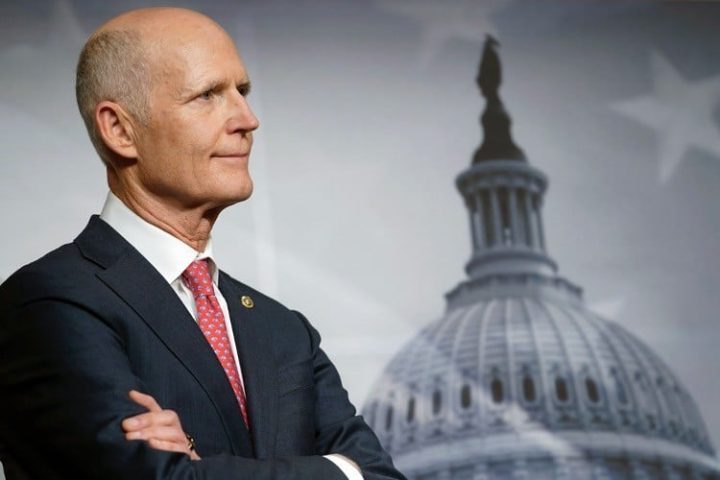
Senator Rick Scott (R-Fla.) said this week that he is tired of his party “caving” on the nation’s debt limit and is applying pressure on Senate Minority Leader Mitch McConnell (R-Ky.) not to agree to a last-minute deal with President Joe Biden.
Last week, Scott and 23 Republican senators sent a letter warning Biden and Democrats that they won’t support increasing the debt ceiling without spending cuts and structural reform in spending to help reduce the nation’s $31 trillion debt.
“We, the undersigned members of the Senate Republican Conference, write to express our outright opposition to a debt-ceiling hike without real structural spending reform that reduces deficit spending and brings fiscal sanity back to Washington,” wrote the GOP senators.
The group letter continued, “It is the policy of the Senate Republican conference ‘that any increase in the debt ceiling must be accompanied by cuts in federal spending of an equal or greater amount as the debt ceiling increase, or meaningful structural reform in spending, such as the Prevent Government Shutdowns Act and the Full Faith and Credit Act.’ We intend to stand by that policy.”
“The letter was led by Sen. Mike Lee (R-Utah) and co-signed by 23 other GOPs, including Sens. Marsha Blackburn (R-Tenn.), Ron Johnson (R-Wis.), Mike Braun (R-Ind.), Tedd Budd (R-N.C.), Ted Cruz (R-Texas), Rick Scott (R-Fla.), Rand Paul (R-Ky.), Mike Crapo (R-Idaho), James Risch (R-Idaho.), John Barrasso (R-Wyo.), and James Lankford (R-Okla.),” reported The Epoch Times.
McConnell, Senate GOP Whip John Thune (R-S.D.), and Senator John Cornyn (R-Texas) reportedly did not sign the letter. McConnell said, “I wouldn’t read too much into it. There are letters floating around in our conference all the time. Most of the time, I don’t sign them.”
Scott ran against McConnell for the Republican Senate leadership role last November, seeking to bring about a positive change for the party’s leadership. But Senate Republicans reelected McConnell in a closed-door leadership election, defeating Scott in a 37-10 vote. Since then, Scott has been quite vocal about Republicans not giving up on efforts to cut federal spending tied to the now-expired debt limit.
“I’m not going to back down,” Scott told The Hill during an interview in his Capitol office after McConnell decided to remove the Florida senator from the Senate Committee on Commerce, Science, and Technology. McConnell also removed Senator Mike Lee (R-Utah), who nominated Scott for Senate Republican leader in November and helped lead the fight against passing last year’s omnibus spending bill from the Commerce panel.
“We’re on the road to woke socialism, and Republicans are just a speed bump. We can’t keep doing the same old thing. It’s time for Republicans to be bold, speak the truth, and stop caving in,” Scott said in a Rescue America Plan website ad last month.
The fiscally conservative Scott has been fighting with McConnell over budget cuts and the debt limit since April of 2021. He then reportedly pushed to amend the Senate GOP conference rules to require that “any increase in the debt ceiling must be accompanied by cuts in federal spending of an equal or greater amount as the debt ceiling increase, or meaningful structural reform.”
“Scott said McConnell then ‘caved’ in the fall of 2021 when he worked out a deal with Senate Majority Leader Charles Schumer (D-N.Y.) to create a one-time procedural exception to allow debt-limit legislation to advance on the Senate floor without having to face a filibuster,” said The Hill.
In 2021, McConnell’s deal with Schumer was to let Democrats raise the debt limit with votes from their party, allowing Democrats to take full responsibility for raising the debt ceiling. However, 10 Republican votes were needed to create the procedural loophole.
“I took an amendment vote [in] April to the conference, we adopted it and then … the leader caved,” Scott told The Hill, noting that the Senate GOP members had agreed unanimously that “we were going to cut cost [sic] or we were going to have structural change” in exchange for raising the debt limit.
McConnell doubts a Senate debt-limit agreement would ever pass the House, which would leave any successful spending-cut legislation in the hands of House Speaker Kevin McCarthy (R-Calif.). “We’re all behind Kevin and wishing him well in the negotiation,” McConnell told reporters last week.
Speaker McCarthy met with Biden last week, where they had a “frank and straightforward dialogue” on the debt limit and government spending. Since then, McCarthy and his divided Republican House members have yet to agree on any specific budget plan.
The clock is ticking louder every day for both Congress and President Biden to agree on spending cuts and the debt limit before the Treasury Department-imposed deadline in June. The battle yet to be truly waged on settling the vast differences between the factions on government spending is one that could trigger an unprecedented default, leading the country into a recession if an agreement is not reached in time.
Based on the history of earlier debt-limit decisions and their fiscally irresponsible outcomes, one can only hope a compromise is finally reached that does involve spending cuts to begin the reduction of the massive $31 trillion national debt. Otherwise, we can all expect Republican representatives in Congress to be no more than, as Scott said, a speed bump “on the road to woke socialism.”




